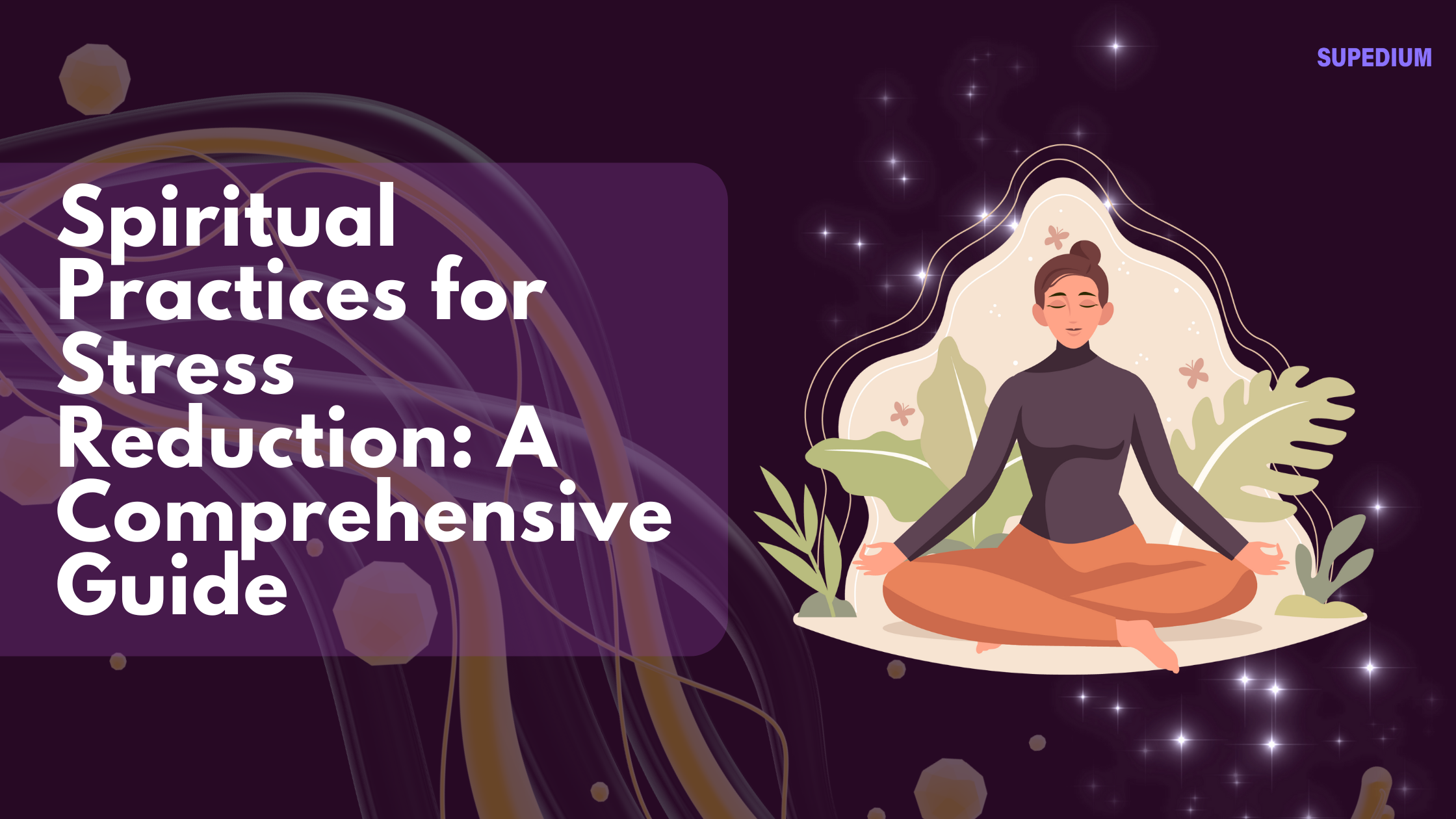Table of Contents
![]()
In today’s fast-paced world, stress has become a common experience that impacts both our physical and emotional well-being. Fortunately, integrating spiritual practices into daily life can be an effective way to manage and reduce stress. This article explores various spiritual practices that can help alleviate stress, offering insights into how these practices work and how to incorporate them into your life.
Understanding Stress and Spiritual Practices
Stress is a physical and emotional response to demands or pressures that can overwhelm us. Chronic stress can lead to a range of health issues, including anxiety, depression, and cardiovascular problems. Spiritual practices, which often focus on inner peace, connection, and mindfulness, can provide valuable tools for managing stress.
Spiritual practices address stress by promoting relaxation, enhancing emotional resilience, and fostering a sense of connection and purpose. By engaging in these practices, individuals can achieve a greater sense of calm and balance in their lives.
Meditation
Meditation is a widely recognized spiritual practice for stress reduction. There are several types of meditation, each offering unique benefits:
- Mindfulness Meditation
- Definition and Principles: Mindfulness meditation involves paying attention to the present moment without judgment. This practice helps individuals become aware of their thoughts and feelings, allowing them to respond to stressors more calmly.
- Techniques and Practices: Common techniques include focusing on the breath, body scan, and mindful observation of thoughts. Regular practice, even if only for a few minutes a day, can enhance mindfulness and reduce stress.
- Benefits for Stress Reduction: Research indicates that mindfulness meditation can lower stress levels, improve emotional regulation, and increase overall well-being.
- Transcendental Meditation
- Overview and Technique: This form of meditation involves silently repeating a mantra to settle the mind into a state of restful awareness. Practiced for about 20 minutes twice a day, it aims to transcend ordinary thought processes.
- Research and Effectiveness: Studies have shown that Transcendental Meditation can reduce stress, lower blood pressure, and improve cognitive function.
- Guided Meditation
- How It Works: Guided meditation involves listening to a guide who leads the practitioner through a series of visualizations and relaxation exercises.
- Types of Guided Meditations: These can range from stress-relief sessions to specific themes like self-compassion or gratitude.
- Impact on Stress and Anxiety: Guided meditation can help individuals relax deeply and address specific stressors, making it a practical option for many people.
Prayer
Prayer is a spiritual practice that can offer comfort and reduce stress through connection and reflection:
- Types of Prayer
- Traditional Prayer: Communicating with a higher power or divine being according to one’s religious beliefs.
- Affirmative or Positive Prayer: Focusing on positive affirmations and desired outcomes.
- Intercessory Prayer: Praying on behalf of others, which can foster a sense of empathy and connection.
- Psychological and Emotional Benefits
- Sense of Connection and Support: Prayer can provide a sense of belonging and support, reducing feelings of isolation.
- Reducing Feelings of Isolation: By turning to prayer, individuals can feel connected to a greater purpose or community, alleviating loneliness.
- Incorporating Prayer into Daily Life
- Creating a Prayer Routine: Establishing regular times for prayer can help integrate this practice into daily life.
- Examples and Resources: Utilizing prayer books, apps, or community groups can enhance the practice.
Yoga and Movement Practices
Yoga and other movement practices blend physical activity with spiritual focus, promoting stress reduction:
- Yoga
- Overview of Yoga as a Spiritual Practice: Yoga combines physical postures, breath control, and meditation to enhance overall well-being.
- Types of Yoga for Stress Reduction:
- Hatha Yoga: Focuses on gentle poses and breathing, ideal for relaxation.
- Vinyasa Yoga: Involves flowing sequences that can be invigorating and stress-relieving.
- Yin Yoga: Emphasizes deep stretching and holding poses for longer periods, promoting relaxation.
- Benefits and Techniques: Regular practice can improve flexibility, reduce muscle tension, and calm the mind.
- Tai Chi and Qigong
- Principles and Practices: These ancient Chinese practices involve slow, deliberate movements and breathing techniques that cultivate inner energy (Qi).
- Effects on Stress and Mental Health: Tai Chi and Qigong can enhance mental clarity, reduce stress, and improve balance and flexibility.
- Integrating Movement into Daily Routine
- Simple Practices for Beginners: Starting with short, manageable sessions and gradually increasing practice time can make it easier to incorporate movement practices into daily life.
- Finding the Right Type of Movement Practice: Experimenting with different styles can help identify what works best for individual needs.
Visualization and Guided Imagery
Visualization and Guided Imagery are techniques that involve creating mental images to promote relaxation and stress reduction:
- Techniques for Visualization
- Creating Mental Images for Relaxation: Visualization involves imagining peaceful or pleasant scenes to induce a state of calm.
- Using Visualization for Stress Management: Techniques can include visualizing a safe place, successful outcomes, or positive experiences.
- Guided Imagery
- Definition and Practice: Guided imagery involves following a script or guide to mentally explore calming and soothing scenarios.
- Common Scenarios and Scripts: Guided imagery can include journeys to tranquil settings or visualizing personal success and well-being.
- Evidence of Effectiveness
- Research Findings: Studies have demonstrated that guided imagery can reduce anxiety, improve mood, and enhance overall relaxation.
- Personal Testimonials: Many individuals report significant benefits from incorporating guided imagery into their stress management routines.
Journaling and Reflection
Journaling and Reflection are spiritual practices that encourage self-exploration and emotional processing:
- Spiritual Journaling
- Types of Journaling: Gratitude journals, reflective journals, and goal-oriented journals can help individuals process their thoughts and feelings.
- Benefits for Stress Reduction: Journaling can provide a safe outlet for expressing emotions, clarifying thoughts, and tracking personal growth.
- Reflective Practices
- Self-Exploration and Growth: Reflective practices involve examining one’s experiences and learning from them to foster personal development.
- Techniques and Prompts: Using specific prompts or questions can guide reflection and enhance self-awareness.
- Integrating Journaling into Daily Life
- Establishing a Journaling Routine: Setting aside time each day or week for journaling can help make it a consistent practice.
- Tools and Resources: Journals, apps, and online platforms can offer various tools and prompts for effective journaling.
Community and Support Systems
Community and Support Systems play a crucial role in spiritual practices for stress reduction:
- Role of Spiritual Communities
- Church, Temple, or Other Religious Gatherings: Participating in communal spiritual activities can provide emotional support and a sense of belonging.
- Online Spiritual Communities: Virtual communities offer opportunities for connection and support regardless of geographic location.
- Benefits of Social Support
- Emotional Support and Connection: Engaging with a supportive community can alleviate stress and provide encouragement.
- Shared Experiences and Collective Stress Relief: Sharing experiences with others who understand can enhance stress relief and emotional resilience.
- Finding and Engaging with Support Systems
- Identifying Local or Online Communities: Exploring various spiritual groups and forums can help find the right fit for individual needs.
- Building Meaningful Connections: Actively participating in community activities can foster deeper relationships and support.
Nature and Contemplative Practices
Nature and Contemplative Practices focus on connecting with the natural world and engaging in reflective activities:
- Spending Time in Nature
- Benefits of Natural Settings for Mental Health: Exposure to nature can reduce stress, improve mood, and enhance overall well-being.
- Practices for Connecting with Nature: Activities such as walking in a park, gardening, or simply sitting outdoors can be soothing and grounding.
- Contemplative Practices
- Solitude and Silence: Spending time alone in a quiet environment can promote inner peace and clarity.
- Observing and Reflecting on Nature: Contemplative observation of natural surroundings can facilitate mindfulness and relaxation.
- Incorporating Nature into Spiritual Practice
- Daily Practices and Rituals: Integrating nature-based rituals, such as mindful walks or nature-based meditations, into daily life can enhance spiritual connection and stress relief.
- Benefits and Personal Experiences: Many individuals find that nature helps them reconnect with themselves and gain perspective on their stressors.
Conclusion
Spiritual practices offer valuable tools for managing and reducing stress by fostering relaxation, emotional resilience, and a sense of connection. Whether through meditation, prayer, yoga, visualization, journaling, community support, or nature, these practices can help individuals navigate the challenges of modern life with greater ease.
To experience the benefits of these practices, it is essential to find what resonates with you personally. Integrating these practices into daily life can lead to long-term stress reduction and improved overall well-being. For further exploration, consider accessing resources such as books, online courses, and community groups dedicated to spiritual and stress management practices.
By making a conscious effort to incorporate these practices, you can cultivate a more balanced and peaceful life.
Share This





Be the first to comment